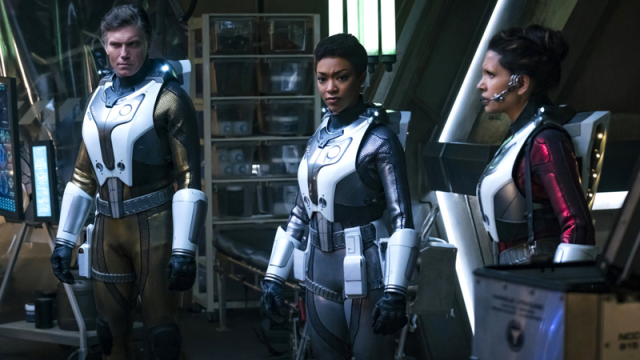It feels like Alex Kurtzman has been talking about Star Trek: Discovery’s approach to canon pretty much since the dawn of time (or at least, since everyone found out the show was set before the original Trek). Discovery’s already had to toe a pretty weird line when it comes to its approach to Star Trek’s past, but in his latest musing, Kurtzman makes a pretty good point.
Speaking to Entertainment Weekly ahead of the series’ return next week, the executive producer was faced with the same question he’s been answering for a good while at this point: but what about canonnnn? In response, Kurtzman brought up a pretty good point for something with such a storied background and world as Star Trek—which is that there’s a fine line between being able to weave a new story into that established fiction, and tripping over yourself for the sake of wiki point-scoring:
… I actually think somewhere between what I’m saying and what you’re saying is the truth. We really do spend a lot of time talking a lot about canon and there are people in the writers’ room specifically to tell us where we’re stepping on the line of violation. I did actually note at one point when I was asked about the graphic novels and comics that after 50-plus years it’s literally impossible to stay entirely consistent with canon because there have been very dry years in Star Trek and very full years and so many different writers have attempted to fill in the gaps in the dry years of what happened to beloved characters in the absence of a show driving those answers, they end up inventing things and we end up being faced with whether to call that canon. But it’s always a conversation.
I will agree with you, though, that the best version of the story needs to be the driver. But what’s the best version of a story is an entirely subjective thing. That’s why we have so many different voices in the writers room with so many different points of view. You want to write a nuanced story to get as many different voices as possible to represent how they feel about different ideas. A big part of my process is listening to the other writers. With Trek, you want to go out and beta-test ideas. But as soon as you do that you’ll get 50 per cent of people telling you they love it and 50 per cent saying you should be strung up and killed. At a certain point you need to follow your own internal compass, but you don’t want to do it in a vacuum — that’s very dangerous — so we hire people to express what they think Star Trek means, and where we’re violating canon and what we can invent within the grey area.
So, yes, we want to stay true to canon, but we’re also doing a lot of new invention that has nothing to do with canon. There’s a lot of conversation online like, “Why don’t you start with new things? Why do you have to look back?” And the answer is, “We can do both.” We have to do both. Star Trek has always done both.
Of course, Discovery’s first and foremost duty is to telling a new story with its new characters, and that should override any particular demand that it has to fit into what’s already come in over 50 years of books, comics, TV shows, and movies. While it plays with fire by trying to tie itself up in the lives of original Trek figures like Captain Pike and Spock, as long as it can find a good story to tell in that space, it doesn’t matter than the bridge of the Discovery looks a lot less like a ‘60s studio set than what we know a Constitution-Class Starship’s bridge did in the original Star Trek. There’s going to be a compromise for the sake of making something that works in a modern TV show, even if its not truly canonically accurate.
This kind of makes Kurtzman’s constant need to clarify in interviews that Discovery is being true to that canon—even as it twists and reshapes and recontextualizes bits of it—a little overbearing, even if it is pretty much just manna to sustain grumbling diehards. Discovery has been at its best challenging ideas and themes that have been part of Star Trek for decades, rather than the bits where it clunkily tries to make itself “matter” by enmeshing new additions onto characters we already know and love. It doesn’t matter if it’s strictly canonical to every piece of Star Trek fiction out there. As long as the ballpark’s close enough, it can continue to merrily add its own things into this expansive galaxy of stories.
For more, make sure you’re following us on our new Instagram @io9dotcom.
